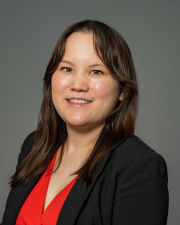Biography
Amy Garcia, PhD, NCSP is an Assistant Professor in the Louis A. Faillace, MD Department of Psychiatry and Behavioral Sciences, specializing in the assessment of autism spectrum disorder (ASD) across the lifespan. She earned her PhD in school psychology at the University of Houston. During her time in graduate school, Garcia trained in autism assessment in Houston area school districts, UTHealth CLASS Clinic, and Texas Children’s Hospital Autism Center. She completed her doctoral psychology internship at Marcus Autism Center in the Clinical Assessment and Diagnostics track and her postdoctoral fellowship in clinical psychology under the supervision of Katherine Loveland through the Louis A. Faillace, MD Department of Psychiatry and Behavioral Sciences, Lifespan Autism (C.L.A.S.S.) Clinic and Center for Human Development Research.
Garcia uses a neurodiversity lens and person-centered approach when assessing individuals of all ages for features of autism. She believes in working collaboratively with clients and their families throughout all parts of the evaluation process. Garcia also has an active role in supervising practicum students, interns, and postdoctoral fellows and hopes to instill the same passion for helping individuals with autism and their families.
Education
- Doctoral Degree
- University of Houston
- Doctoral Internship
- Marcus Autism Center/Children’s Healthcare of Atlanta, Clinical Assessment and Diagnostics Track
- Fellowship
- Clinical Psychology, Louis A. Faillace, MD Department of Psychiatry and Behavioral Sciences Lifespan Autism (C.L.A.S.S.) Clinic and Center for Human Development Research
Areas of Interest
Clinical Interests
- Assessment of autism spectrum disorder (ASD) across the lifespan (2-60+)
- Assessment of other neurodevelopmental differences (e.g., attention-deficit/hyperactivity disorder, intellectual disability, learning disability)
- Therapy for co-occurring anxiety in children with ASD
Research Interests
- Improving assessment methods for autism in adulthood
- Understanding the experiences of late-diagnosed autistic adults
